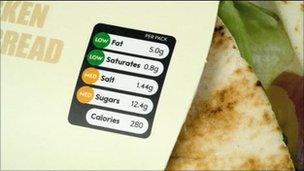Why a nudge is not enough to change behaviour
- Published
- comments

'More should be done' to ensure the traffic light label system is used, the committee says
Much of what all governments do concerns trying to change our behaviour - but what is the best way to do that?
The government has favoured the "nudge" - persuading rather than telling people to change their behaviour.
But Baroness Julia Neuberger, chair of a Lords' committee which has just published a report on the issue, explains why it has concluded that nudge alone will not work.
Governments want us to smoke less, drink less, eat more healthily and exercise more.
In November 2010 the Health Secretary Andrew Lansley told us that the government would "nudge" rather than "nanny" us to better health.
But after investigating the science of behaviour, our committee found that the government can't rely on "nudging" to do all the work, particularly with a complicated and deep-rooted problem like obesity.
Instead, it must understand that there is a whole variety of influences that shape our behaviour and realise that successful interventions will target a number of these influences, using a whole range of different policies.
"Nudging" emphasises the role of our environment - both social and physical - in influencing our behaviour.
For a policy to be a "nudge" it has to involve changing that environment in a way that doesn't restrict our choices or change financial incentives.
In other words, "nudging" provides a new alternative to regulatory and fiscal measures.
For example, the ban on smoking in public places isn't a "nudge" because it restricts choice, but putting unpleasant pictures showing the impact of smoking is.
'Unimpressed'
There's no doubt that, when it comes to our health, our environment really matters.
But the government must recognise that "nudging" isn't the only way to make a difference.
Sometimes changing the environment will require something stronger.
The move to introduce higher alcohol pricing is a good example of how legislation can be used to change our behaviour by changing our environment.
Businesses also have a huge effect in shaping our environment.
The government is also trying to "nudge" businesses to behave differently, through voluntary agreements rather than regulation.
But we were unimpressed by the agreements that have been reached so far under the public health responsibility deal.
'Act now'
So we have urged the government to base agreements on the evidence about what will work to change behaviour, rather than what the businesses are happy to accept.
In particular, we recommend that they take steps to ensure that traffic-light nutritional labels are used on all food packaging and that they extend the restrictions on marketing unhealthy products to children.
Some supermarket chains agree with us on traffic-light labelling, and have shown that it does change behaviour.
If government can't achieve these changes through voluntary agreement, they should use regulation instead, or as well.
Obesity is a major societal problem which requires urgent action.
The same is true of other behaviours damaging to health, like binge drinking.
The government cannot wait and see if "nudging" us, or "nudging" businesses, is going to pay off.
They must act now in the light of what science tells us about how to change behaviour.
And, for the most important problems facing us at the moment, the science says that "nudging" won't be enough.